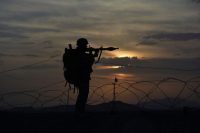
For Peace in Afghanistan, Talk to Pakistan
The Trump administration’s Afghanistan policy review provides an opportunity to confront a central truth: No strategy, even with more troops, will succeed without reducing Pakistan’s support for the Afghan Taliban and the affiliated Haqqani network that is responsible for some of the deadliest attacks against the United States and its partners in Afghanistan.
After more than $30 billion in assistance to Pakistan since 2002, it is understandable that critics of the current United States policy toward Pakistan advocate a more coercive approach: slapping further conditions on assistance, imposing sanctions or listing Pakistan as a state sponsor of terrorism.
The trouble is that such “sticks” are unlikely to change Pakistan’s behavior, because its existential concerns are tied to broader regional priorities.… Seguir leyendo »


